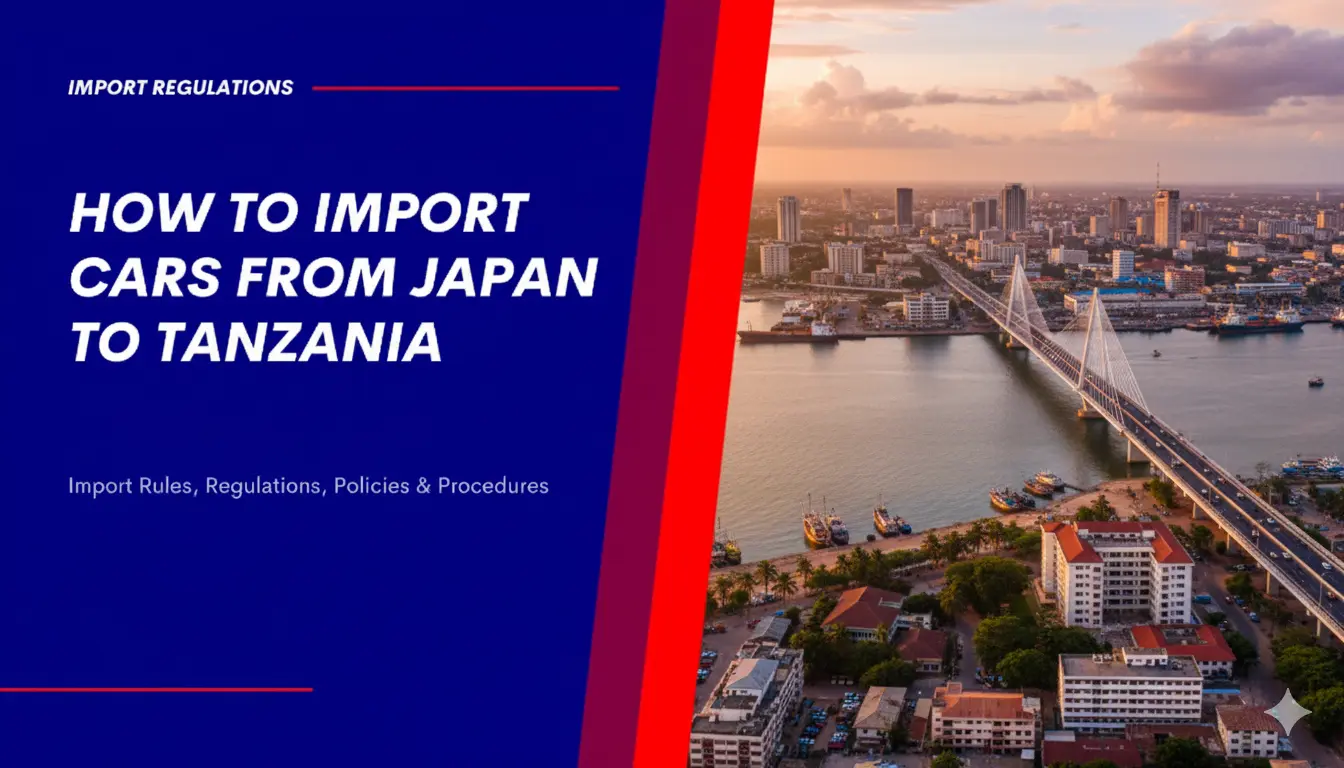
Importing used cars from Japan to Tanzania is a common practice due to the affordability and high quality of Japanese vehicles. However, Tanzania enforces strict rules and regulations to ensure imported vehicles meet road safety and environmental standards. This guide outlines the procedures, duties, and regulations that must be followed when importing cars from Japan into Tanzania.
Import Rules and Regulations
Age Limit of Imported Vehicles
Tanzania has strict age limits on imported vehicles to minimize environmental pollution and ensure road safety:
- Passenger vehicles should not exceed 10 years from the date of manufacture.
- Heavy-duty vehicles and other large commercial vehicles have no specific age limit, but all vehicles must meet Tanzanian standards for roadworthiness.
Vehicles older than the allowed age limit are subject to additional excise duties, making it essential to confirm the car’s age before import.
Vehicle Inspection
All vehicles being imported into Tanzania must undergo a mandatory inspection by the Japan Export Vehicle Inspection Center (JEVIC) or other approved inspection authorities. The inspection focuses on roadworthiness and vehicle condition, covering key areas such as:
- Structural integrity
- Emissions compliance
- Odometer accuracy
The inspection certificate must be presented at the Tanzanian port of entry. Vehicles without this certification may be denied entry or face penalties.
Import Duties and Taxes
When importing a vehicle to Tanzania, several taxes and duties apply. These include:
- Import Duty: Ranges between 0% and 25%, depending on the vehicle type and engine size.
- Excise Duty: Applied based on engine capacity. It is calculated at 5% to 20% for vehicles with larger engine sizes (typically above 2000cc).
- Value Added Tax (VAT): A standard VAT rate of 18% is charged on the vehicle’s total cost, including CIF (Cost, Insurance, and Freight), import duty, and excise duty.
- Railway Development Levy (RDL): 1.5% of the customs value of the vehicle.
These fees and taxes are based on the CIF value, which is the combined total of the vehicle’s purchase price, insurance, and shipping costs to Tanzania.
Prohibited Vehicles
Tanzania prohibits the importation of left-hand drive vehicles. The only exception applies to special purpose vehicles such as ambulances or firefighting trucks. Additionally, vehicles that fail inspection due to mechanical issues, excessive age, or other safety concerns may not be permitted entry.
Procedures for Importing Cars
Step 1: Purchase and Inspection of the Vehicle
The first step is to select a suitable vehicle from a Japanese exporter. It’s important to verify that the vehicle meets the age limit and condition standards. Ensure that it undergoes the required inspection by JEVIC or an authorized body before shipment.
Step 2: Arrange Shipping and Documentation
Once the vehicle passes inspection, the exporter arranges shipping to a Tanzanian port, typically the Port of Dar es Salaam. Essential documents that need to be prepared include:
- Bill of Lading (BOL)
- Inspection Certificate (from JEVIC)
- Commercial invoice
- Import Declaration Form (IDF)
These documents are necessary for customs clearance upon the vehicle’s arrival in Tanzania.
Step 3: Customs Clearance and Payment of Duties
After the vehicle arrives at the port, all necessary documentation must be presented to customs authorities. The vehicle will then be assessed for import duties, VAT, and other applicable fees based on its CIF value. It is essential to ensure that all taxes and duties are paid promptly to avoid delays or penalties.
Step 4: Vehicle Registration
After customs clearance, the vehicle must be registered with the Tanzania Revenue Authority (TRA). The registration process includes obtaining a local number plate and logbook, making the vehicle legally operational on Tanzanian roads.
Roadworthiness and Environmental Standards
To ensure road safety, vehicles imported into Tanzania must comply with roadworthiness and environmental regulations. The vehicle must pass the mandatory JEVIC inspection, which checks for emissions standards and structural integrity. Non-compliant vehicles are either refused entry or subjected to additional fines or modification requirements before they can be driven on Tanzanian roads.
Emission Standards
Tanzania is increasingly focusing on environmental standards, with stricter regulations on vehicle emissions. Imported vehicles must meet acceptable levels of emissions, and failure to comply could result in the vehicle being rejected or modified at the importer’s expense.
Commonly Imported Vehicles
Japanese cars are highly sought after in Tanzania due to their durability, fuel efficiency, and ease of maintenance. Popular models include:
- Toyota: Especially the Toyota Land Cruiser, Prado, and Corolla.
- Nissan: The Nissan X-Trail and Nissan March are common choices.
- Mitsubishi: Known for the Pajero and Lancer models.
- Suzuki: The Suzuki Swift is another popular choice for personal transport.
These vehicles are preferred for both urban commuting and navigating Tanzania’s diverse terrain.
Key Considerations for Importing Cars
Import Costs
When budgeting for a vehicle import, remember to account for all costs beyond just the purchase price. These include shipping fees, insurance, customs duties, taxes, and registration fees. Additionally, if the vehicle requires modifications to meet Tanzanian standards, this could increase the overall cost.
Avoiding Penalties
Ensure that the vehicle complies with Tanzania’s regulations before shipment to avoid unnecessary penalties. Non-compliance with age restrictions, failure to pass the required inspections, or attempting to import prohibited vehicles can result in costly fines or rejection at the port.
Biosecurity Measures
Imported vehicles must be thoroughly cleaned before shipping to ensure they meet Tanzania’s biosecurity standards. Dirt, plant matter, or animal residues found on a vehicle can lead to quarantine measures and additional cleaning costs.
Conclusion
Importing a vehicle from Japan to Tanzania is a process that requires careful planning and adherence to regulations. By following the set guidelines for vehicle age, inspections, and paying the correct duties and taxes, Tanzanians can benefit from the reliability and affordability of Japanese cars. Ensuring that all documentation is in order and that the vehicle complies with Tanzanian standards will help avoid delays and additional costs.

